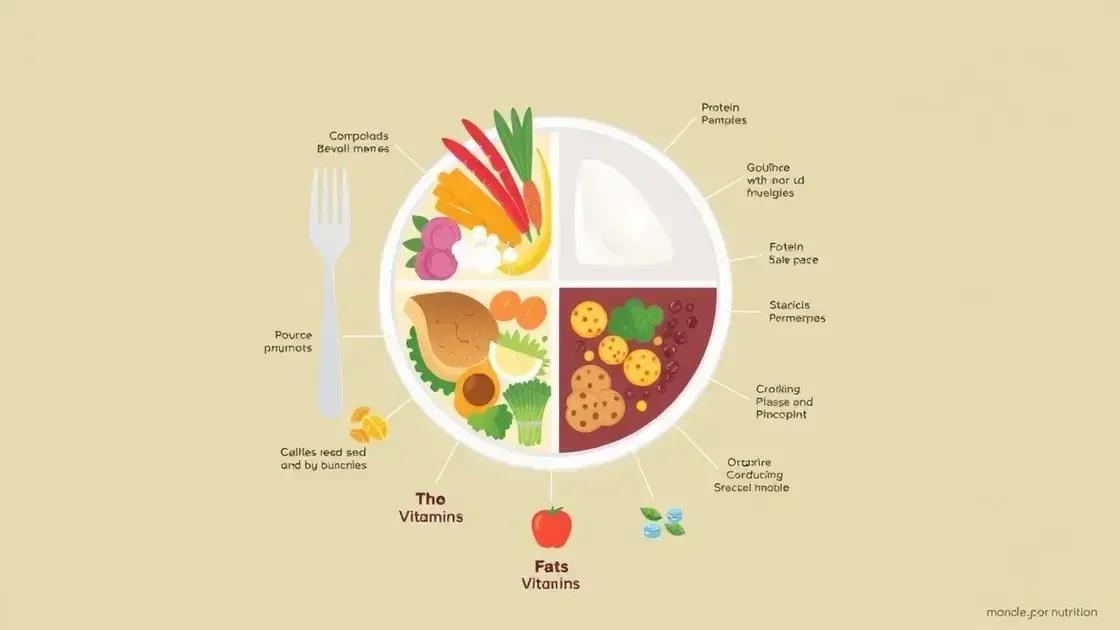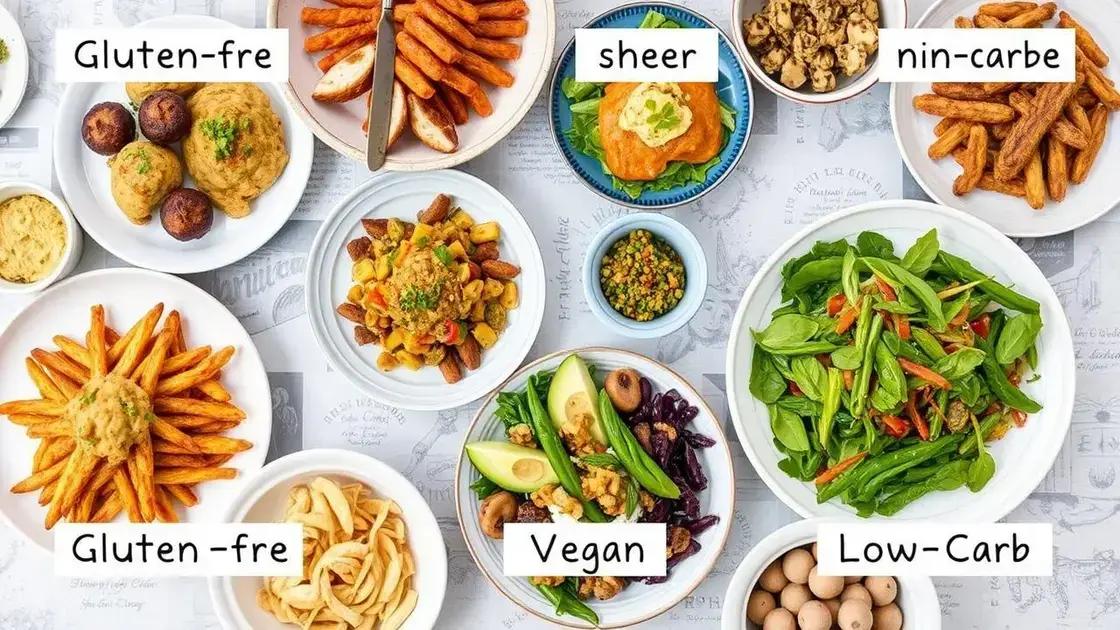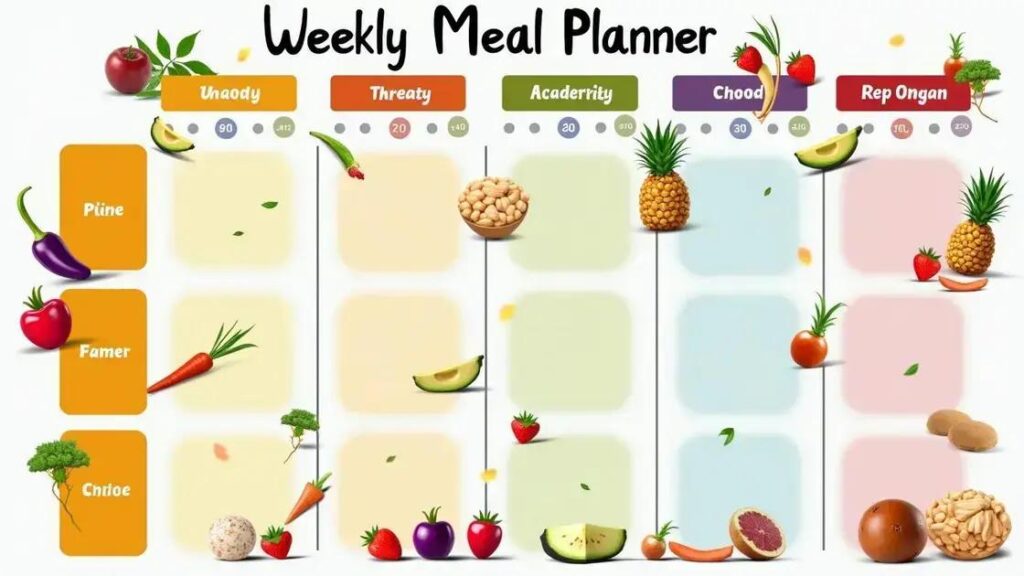Building a weekly meal plan for balanced nutrition involves setting clear goals, understanding balanced nutrition, choosing diverse meals, preparing ingredients in advance, and adapting plans to meet dietary needs for optimal health and convenience.
In today’s fast-paced world, building a weekly meal plan for balanced nutrition is essential for maintaining health and wellness. Meal planning not only saves time but also ensures that you consume a balanced diet rich in essential nutrients. This guide will help you understand the components of a balanced meal, provide actionable steps to create a weekly plan, and offer tips for meal prep success.
Understanding Balanced Nutrition

Understanding balanced nutrition is crucial for maintaining a healthy lifestyle. It involves consuming a variety of foods in the right proportions to provide your body with the nutrients it needs. A balanced diet includes macronutrients like carbohydrates, proteins, and fats, as well as micronutrients such as vitamins and minerals.
Macronutrients
Carbohydrates are the body’s primary source of energy. Choosing whole grains, fruits, and vegetables can provide essential fiber which aids digestion.
Proteins are vital for building and repairing tissues. Incorporating sources like lean meats, beans, and nuts can help meet your protein needs.
Fats are essential for brain health and hormone regulation. Prioritize healthy fats found in avocados, olive oil, and fatty fish.
Micronutrients
Vitamins and minerals, though needed in smaller amounts, play critical roles in bodily functions. For instance, calcium is important for bone health, while Vitamin C supports the immune system.
Staying Hydrated
Water is often overlooked but is vital for overall health. Aim for at least 8 cups a day, adjusting based on activity levels and climate.
Portion Control
Understanding portion sizes is important, too. Use measuring cups or your hand to gauge appropriate servings for each food group.This practice helps prevent overeating and promotes a healthy metabolism.
Steps to Create a Meal Plan

Creating a meal plan helps you stay organized and healthy. Here are the steps to create a meal plan effectively:
Step 1: Set Your Goals
Decide what you want to achieve with your meal plan. Are you looking to lose weight, maintain your current weight, or just eat healthier? This will guide your food choices.
Step 2: Assess Your Current Diet
Take a look at your current eating habits. Keep a food diary for a week to see what you eat. Identify areas where you can improve.
Step 3: Choose Your Meals
Select recipes for breakfast, lunch, and dinner for the week. Aim for variety by including different proteins, grains, and vegetables. Make sure to consider your favorites as well.
Step 4: Create a Shopping List
Once you have your meals selected, make a shopping list based on the ingredients needed. Check your pantry to avoid buying duplicates. Stick to your list while shopping to keep costs down.
Step 5: Prepare Your Meals
Consider doing meal prep on weekends or your day off. Cook larger batches of grains, proteins, and chopped vegetables. Store them in reusable containers for easy access during the week.
Step 6: Be Flexible
Life can be unpredictable. Be ready to swap meals around as needed, and don’t stress if plans change. The goal is to make healthy eating easier.
Tips for Meal Prep Success

To achieve meal prep success, follow these helpful tips:
Tip 1: Plan Your Menu
Before you start prepping, decide on what meals you want to cook for the week. This saves time and makes shopping easier.
Tip 2: Use Quality Containers
Invest in good quality, airtight containers. They help keep your meals fresh and make it easy to store in the fridge or freezer.
Tip 3: Batch Cook
Cook large portions of proteins, grains, and vegetables at once. This allows you to mix and match throughout the week, making meals quick and easy.
Tip 4: Keep it Simple
Choose recipes with fewer ingredients. Simple meals can be just as nutritious and take less time to prepare.
Tip 5: Label Your Meals
Use labels on your containers to mark the date and contents. This helps prevent any food waste and keeps you organized.
Tip 6: Schedule a Prep Day
Set aside a specific day each week for meal prep. Making it a routine will make it easier to stick with your healthy eating goals.
Tip 7: Stay Organized
Keep your kitchen organized to streamline food preparation. Arrange your fridge and pantry so you can see what you have at a glance.
Adapting Your Plan for Dietary Needs

When it comes to adapting your meal plan for dietary needs, everyone’s requirements are different. Here are some tips to help you tailor your plans effectively:
Consider Food Allergies
If you or someone in your household has food allergies, avoid those ingredients completely. Read labels carefully and choose alternatives that are safe and nutritious.
Accommodate Dietary Preferences
Whether you are vegetarian, vegan, or follow a specific diet, like keto or paleo, adjust your meals accordingly. Explore plant-based proteins, healthy fats, and low-carb options.
Portion Control
Each diet may require different portion sizes. Understanding what fits your dietary needs will help you serve the right amounts, especially for weight management.
Consult a Professional
If you’re unsure about how to adjust your meal plan for specific dietary concerns, consider consulting a registered dietitian. They can provide personalized advice based on your health goals.
Experiment with Recipes
Don’t be afraid to try new recipes that fit your dietary restrictions. Substitute ingredients and find new favorites that satisfy both your cravings and needs.
Monitor Your Progress
Keep track of how you feel with your meal plan changes. Adjust recipes based on your energy levels, hunger, and overall well-being.
Wrapping Up Your Meal Planning Journey
Building a weekly meal plan for balanced nutrition is a powerful step towards improving your health and lifestyle. By understanding balanced nutrition, following outlined steps, and preparing meals efficiently, you can maintain a nutritious diet with ease.
Adapting your plan for dietary needs ensures that every meal is not only satisfying but also caters to your unique requirements. Whether you seek to lose weight, gain energy, or accommodate allergies, meal planning can make all the difference.
Remember, the key is to stay organized, flexible, and open to adjustments as you navigate your journey toward better nutrition.
FAQ – Frequently Asked Questions About Building a Weekly Meal Plan for Balanced Nutrition
What is a meal plan?
A meal plan is a structured outline of meals to be prepared and eaten over a specified period, usually a week.
How can meal planning help me?
Meal planning can save you time, reduce food waste, help you eat healthier, and ensure you stay within your budget.
What if I have dietary restrictions?
You can adapt your meal plan to accommodate dietary restrictions by selecting recipes that fit your needs, such as gluten-free, vegan, or low-carb options.
How do I create a grocery list for my meal plan?
After selecting your meals for the week, write down all the ingredients needed, check your pantry for items you already have, and organize your list by grocery store sections.
How can I make meal prep more efficient?
Batch cooking, using good quality containers, and scheduling regular prep days can help you make meal prep more efficient and manageable.
Why is it important to monitor my progress?
Monitoring your progress helps you understand how your meal plan affects your health and well-being, allowing you to make necessary adjustments for better results.













